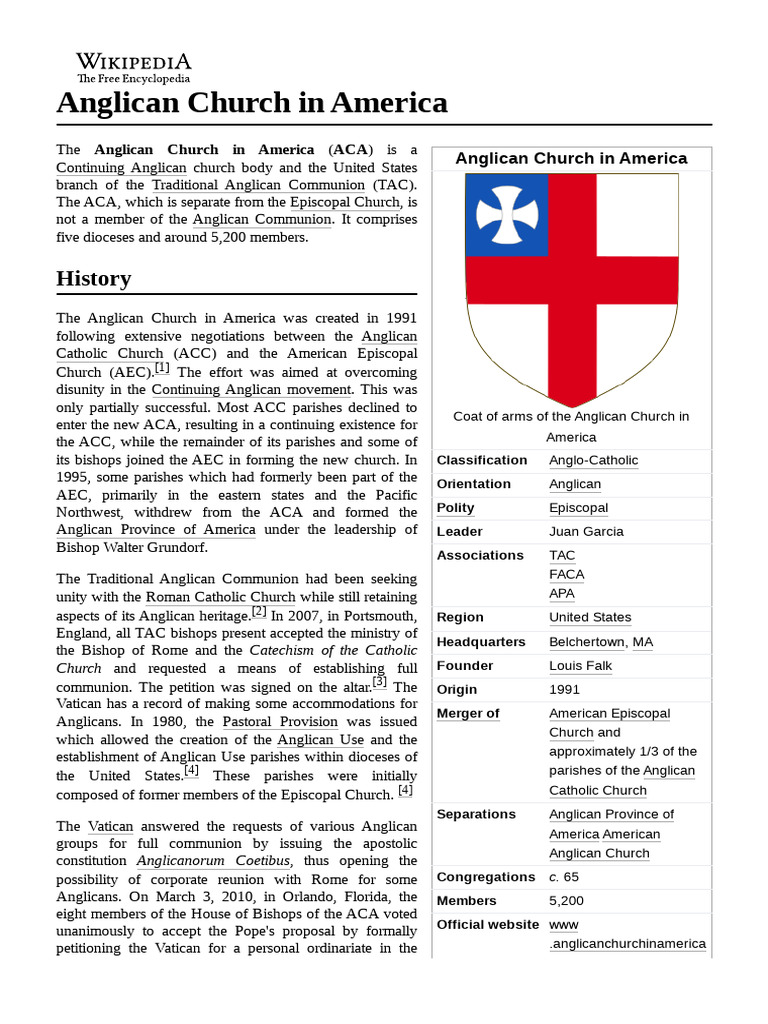The Episcopal Church, a venerable institution within the broader fabric of Christianity, carries forward a rich tradition steeped in Anglican heritage. In the American context, it emerges not merely as a religious denomination but as a unique confluence of theology, liturgy, and community. Yet, what does it mean to be an Episcopalian today, and how does this identity resonate amidst the myriad of modern religious expressions? Let’s embark on this exploration by unearthing the historical and theological foundations of the Episcopal Church, while contemplating the implications for contemporary American society.
At its core, the Episcopal Church traces its origins to the Church of England, established in the 16th century under the tumultuous reign of King Henry VIII. This splintering from Rome introduced distinct theological and liturgical practices, characterized by the Book of Common Prayer. The Anglican tradition, from which the Episcopal Church derives, emphasizes a via media—or “middle way”—between Protestant reformism and Catholic orthodoxy. This moderate stance is manifest in various elements of worship, governance, and scripture, all of which reflect an intention to unite rather than divide.
When the Anglican presence was solidified in America during the colonial era, it stood as a significant religious force. However, following the American Revolution, a complex evolution unfolded. The Episcopal Church, as it came to be known, sought its independence from British ecclesiastical authority, necessitating the establishment of a distinctive American identity within the Anglican communion. This transition was not merely administrative; it posed an intriguing challenge. How does one remain faithful to tradition while simultaneously carving out a novel identity? This question resonates today as the Church navigates cultural shifts.
The development of the Episcopal Church in America blossomed with the creation of the first American Prayer Book in 1789, which inspired a spirit of innovation alongside adherence to tradition. As congregations across the fledgling nation began to establish their guidelines and liturgical practices, they effectively wielded the principles of reason, scripture, and tradition. Hence, the Episcopal Church embodies a unique ecclesiology. Provincial governance empowers local congregations, honoring their autonomy while maintaining a unified doctrine and ritual.
Fast forward to the contemporary landscape, and the Episcopal Church emerges as a harbinger of inclusive dialogue within Christianity. Its theological frameworks embrace both a commitment to tradition and an openness to modern interpretations of faith. Are the sacraments merely religious rites, or do they signify deeper spiritual realities engaging the faithful in the broader cosmos? Such questions challenge traditional boundaries, urging individuals toward a holistic understanding of divine engagement.
Moreover, the Episcopal Church’s engagement with social issues amplifies its relevance. Rooted in the tenets of love, justice, and reconciliation, it addresses pressing societal matters, from racial equality to LGBTQ+ rights. This activism ignites a crucial theological conundrum: how ought Christians to respond to social injustice? Herein lies a pivotal challenge for modern Episcopalians—balancing traditional beliefs with the imperatives of social progression. Can one remain faithful to the teachings of Christ while championing contemporary reform? The answer, it seems, may lie in a robust tradition of prophetic witness.
As we traverse the American context, it is essential to consider the diverse cohort of individuals drawn to the Episcopal Church. The congregation reflects a microcosm of society, entwining eclectic backgrounds, experiences, and beliefs. This multivocality enriches communal worship, yet it also poses existential queries regarding identity and belonging. How does one cultivate unity amidst plurality? Here, theological education and Scripture study become paramount, encouraging congregants to engage with their differences thoughtfully and compassionately.
The liturgical life of the Episcopal Church serves as an anchor amidst the stormy seas of change. The rhythms of worship forge communal bonds, inviting participants into a cyclical journey of spiritual growth. The liturgical calendar, punctuated by feasts and seasons, instills a sense of continuity with the broader Christian tradition. It serves as a reminder that, while cultural norms and individual circumstances may evolve, the essence of faith remains steadfast.
Moreover, the Episcopal Church nurtures a spirit of ecumenism, recognizing the multifaceted expressions of faith within the Christian community at large. This interconnectivity broadens the Church’s perspective, inviting an atmosphere of mutual enrichment rather than competition. It evokes the profound question: Can we envision a world where disparate faith traditions coexist harmoniously, each contributing uniquely to the understanding of the divine? Such a vision, while aspirational, is supported by the Episcopal Church’s commitment to inclusivity.
In summation, the Episcopal Church stands as a dynamic participant in both the historical and contemporary landscapes of American Christianity. Its Anglican roots ground it in a rich theological tradition, yet its adaptability demonstrates an innate responsiveness to the challenges of modernity. As it grapples with issues of identity, inclusivity, and social justice, it invites believers on a journey that is both ancient and novel. Indeed, the Episcopal Church does not merely adapt to cultural currents; it engages them theologically, steadfastly affirming its commitment to faith that is lived in action. Thus, as we continue this journey of exploration, may we all ponder the implications of being a part of this vibrant tapestry of faith and seek to embody the love and grace of Christ in our diverse contexts.



